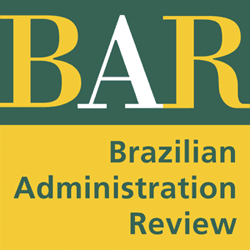EDITORIAL
Greetings!
As usual, there are six articles in this issue. All of them were originally submitted and reviewed during the editorship of my predecessor, Rogério Quintella, and I now have the pleasure to publish them.
Three of the articles are about finance-related topics, one about public management, one about the relationship between culture and management practices, and one about strategy creation and social meanings.
The paper by Antonio Martinez and Miguel Castro (The Smoothing Hypothesis, Stock Returns and Risk in Brazil) investigates the long-term relationship between income smoothing and stock return and risk. Findings indicate that Brazilian smoothers have higher abnormal annualized returns and a smaller degree of systemic risk than non-smoothers. The authors argue that knowing that there is a relationship between smoothing and stock prices can help improve the allocation of resources and portfolio investment decisions.
Based on the concepts of local international management and municipal paradiplomacy, the paper by Carlos Milani and Maria Clotilde Ribeiro (International Relations and the Paradiplomacy of Brazilian Cities: Crafting the Concept of Local International Management) addresses the important issue of how cities can develop transnational cooperation networks and international economic projects in order to move beyond a dependence upon the nation-state in the deployment of transborder public action.
The paper by Adriana Bortoluzzo, Danny Claro, Marco Antonio Caetano and Rinaldo Artes (Estimating Total Claim Size in the Auto Insurance Industry: A Comparison between Tweedie and Zero-Adjusted Inverse Gaussian Distribution) can be particularly useful for those interested in developing a premium pricing strategy in the vehicle insurance industry. The authors identify factors that influence claim size and probability, and compare two estimation methods: Tweedie and zero-adjusted inverse Gaussian (ZAIG).
The fourth paper (Relationship between Abnormal Earnings Persistence, Industry Structure, and Market Share in Brazilian Public Firms), by Antonio Carlos Coelho, Andson de Aguiar and Alexsandro Lopes, uses Ohlson's Linear Information Dynamic (LID) to investigate the impact of industry structure and market share on abnormal earnings of Brazilian firms.
The next paper (Rural Heritage of early Brazilian Industrialists: its Impact on Managerial Orientation), by Fabio Vizeu, argues that Brazil's colonial heritage and the consequent strengthening of the farming system have left a profound impact on social, political and economic modernization processes. As a result, the configuration of the country's industrial management could be characterized by a patriarchal personalist logic, similarly to what can be found in patrimonialist societies.
This issue concludes with an article by Alfredo da Silva, Alexandre Carrieri and Eloisio de Souza (Social Practices and Strategizing: a Study of Produce Merchants in the Vila Rubim Market), who conducted a case study in order to investigate the relationship between strategy creation and the meanings of social practices; particularly the different implications of merchants' behaviors (e.g., strengthening or transgressing the established order).
I would like to take the opportunity to thank and congratulate the editorial team of BAR, as they have been instrumental in helping me manage the editorial process in my first months as editor. I would also like to thank the researchers who are contributing ever more articles to BAR, and those who have dedicated their time and intellectual expertise to the review process.
As for our esteemed readers, I hope you find these papers interesting and insightful.
Jorge Carneiro
Editor-in-Chief
Publication Dates
-
Publication in this collection
20 Jan 2011 -
Date of issue
Mar 2011

